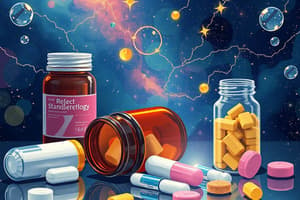Podcast
Questions and Answers
What is the mechanism of action of Sodium Valproate?
What is the mechanism of action of Sodium Valproate?
- Stimulating the release of neurotransmitters
- Decreasing synaptic transmission (correct)
- Blocking the action of neurotransmitters
- Increasing synaptic transmission
What is the classification of Sodium Valproate?
What is the classification of Sodium Valproate?
- Antidepressant
- Antianxiety drug
- Mood Stabilizing (correct)
- Benzodiazepine
What is the usual dose of Sodium Valproate?
What is the usual dose of Sodium Valproate?
- 15mg/kg/ day (correct)
- 25mg/kg/ day
- 10mg/kg/ day
- 20mg/kg/ day
What is a common adverse effect of Sodium Valproate?
What is a common adverse effect of Sodium Valproate?
What is the nurse's responsibility in administering Sodium Valproate?
What is the nurse's responsibility in administering Sodium Valproate?
What should the client be taught to do if they experience a painful rash, hives, blisters, or fever?
What should the client be taught to do if they experience a painful rash, hives, blisters, or fever?
What type of antidepressant is DuloxeTINE?
What type of antidepressant is DuloxeTINE?
What is a side effect of Tricyclic Antidepressants (TCA)?
What is a side effect of Tricyclic Antidepressants (TCA)?
Which receptor may be targeted by future drugs with dual antipsychotic and antidepressant therapeutic potential?
Which receptor may be targeted by future drugs with dual antipsychotic and antidepressant therapeutic potential?
What is a nursing responsibility when patients are taking MAOIs?
What is a nursing responsibility when patients are taking MAOIs?
What is an indication for antidepressant therapy?
What is an indication for antidepressant therapy?
What is a cardiac side-effect of antidepressants?
What is a cardiac side-effect of antidepressants?
What is the therapeutic level of Lithium in the treatment of acute mania?
What is the therapeutic level of Lithium in the treatment of acute mania?
What is a common side effect of Lithium on the cardiovascular system?
What is a common side effect of Lithium on the cardiovascular system?
What is the recommended dosage of Lithium per day in acute mania?
What is the recommended dosage of Lithium per day in acute mania?
What is a dermatological side effect of Lithium?
What is a dermatological side effect of Lithium?
What is an indication for Lithium treatment?
What is an indication for Lithium treatment?
What should the patient be cautioned about when taking Lithium?
What should the patient be cautioned about when taking Lithium?
Flashcards are hidden until you start studying
Study Notes
Mood Stabilizing Drugs
- Foods that interact with mood stabilizing drugs include beef liver, chicken liver, dried fish, overripe fruits, chocolate, wine, beer, and coffee
- Changing positions slowly can minimize orthostatic hypotension
- Lithium is used to treat acute mania, bipolar disorder, and schizoaffective disorder
- Therapeutic levels of lithium are between 0.8-1.2 mEq/L, and prophylactic levels are between 0.6-1.2 mEq/L
Adverse Effects of Lithium
- Neurological: Tremors, motor hyperactivity, muscular weakness, cogwheel rigidity, seizures, delirium, and coma
- Renal: Polydipsia, polyuria, nephrotic syndrome
- Cardiovascular: T-wave depression
- Gastrointestinal: Nausea, vomiting, diarrhea, abdominal pain, and metallic taste
- Endocrine: Abnormal thyroid function, goiter, and weight gain
- Dermatological: Acneiform eruptions, popular eruptions, and exacerbation of psoriasis
- Teratogenic possibility, increased incidence of Ebstein's anomaly during pregnancy and lactation
Nursing Responsibilities for Lithium
- Monitor liver function tests for liver damage
- Monitor BUN and creatinine
- Monitor CBC and electrolytes (leucopenia)
- Observe for changes in mental state
- Observe for allergies
- Teach client to call the physician if there are signs of Stevens-Johnson syndrome
Sodium Valproate
- Dosage is 15mg/kg/day with a maximum of 60mg/kg/day orally
- Indications include acute mania, prophylactic treatment of bipolar disorder, and schizoaffective disorder
- Adverse effects include nausea, vomiting, diarrhea, sedation, weight gain, and thrombocytopenia
Antidepressants
- Classification includes Monoamine Oxidase Inhibitors (MAOI), Tricyclic Antidepressants (TCA), Selective Serotonin Reuptake Inhibitors (SSRIs), and Atypical Antidepressants
- Examples of antidepressants include Phenelzine, Imipramine, Fluoxetine, and Duloxetine
- Indications include depression, depressive episode, dysthymia, and other psychiatric disorders
- Adverse effects include autonomic side-effects, CNS effects, cardiac side-effects, allergic side-effects, and metabolic and endocrine side-effects
Nursing Responsibilities for Antidepressants
- Warn patients on MAOIs about the danger of ingesting tyramine-rich foods, which can result in hypertensive crisis
Studying That Suits You
Use AI to generate personalized quizzes and flashcards to suit your learning preferences.


